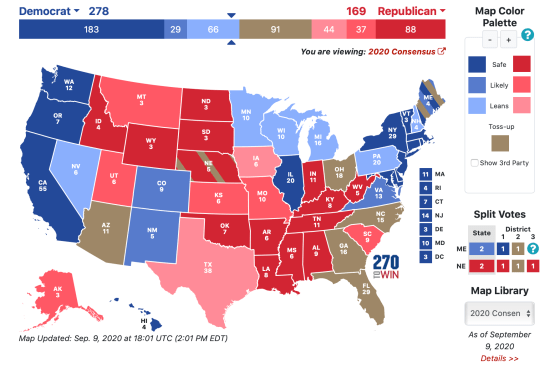
There’s no sure-fire way to know the mind of the electorate, but this map from 270 to Win expresses where pollsters and other experts think the race for the White House is going, based on the information on hand now.
To win, Donald Trump will have to hold the states of Texas and Iowa and swing all the toss-up states (Florida, Georgia, North Carolina, Ohio, and Arizona) into his column. In addition, he must recapture pivotal northern states like Wisconsin, Michigan, and Pennsylvania that he narrowly won last time but that are trending for Biden now.
Trump is a shrewd campaigner, but, as president, he has alienated and outraged so many Americans that it is hard to imagine him winning their votes. He’s likely to do poorly anywhere with sizable minority communities. The black population, in particular, is highly energized against Trump and eager to destroy him at the polls. His predatory and retrograde treatment of women dooms him with this crucial demographic, too. From day one, Trump has treated his political opponents as enemies, spoiling any hope now of making new “friends.”
Underneath Trump is a Republican party that is rotting away. The compromises its leaders have made for Trump’s sake have driven thousands of reputable and influential followers away. Hundreds of high-ranking Republicans have washed their hands of Trump, declared their support for Biden, and counseled rank-and-file voters to do the same.
This discord isn’t free-floating. It’s playing out in states. Former governors and legislators are actually working to defeat their own party’s leader. Trump’s funding is drying up. Many Republicans up for election are shaky. As Trump continues to war against his own party’s establishment, he risks a victory that may doom him, too.
RELATED:
Ruth Ben-Ghiat, “Co-opt and Corrupt: How Trump Bent and Broke the GOP” (NYR)
Jacob Greber, “James and Kathryn Murdoch Become Some of Biggest Anti-Trump Donors“(AFR).
“Trump’s August Fundraising Lags Biden’s By 150 Million” (NPR)
Image: from this source.


